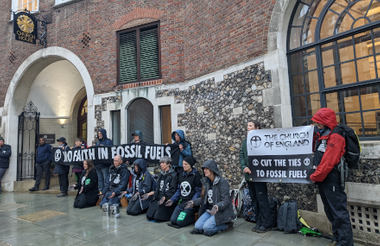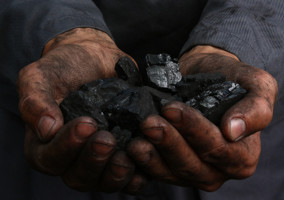Four priests of the Church of England have urged its charity investment arm to “cut ties” with oil and gas companies.
Yesterday, climate action groups including Christian Climate Action and Extinction Rebellion took part in peaceful protests at 13 London sites.
Reverends Jonathan Herbert, Helen Burnett, Hilary Bond and Vanessa Elston called on the Church Commissioners, the Church of England’s pensions board and 11 dioceses to stop investing in fossil fuel giants including ExxonMobil.
The Church Commissioners and pensions board have committed to divesting from all fossil fuel companies not aligned with the Paris Agreement goals by 2023.
However, the organisations have refused to divest entirely from the industry, arguing that they can be more effective by engaging as stakeholders.
Stakeholder engagement
According to its most recently filed accounts, the Church Commissioners had £8.6bn of investment assets as of 31 December 2021, with none of its 20 largest holdings in fossil fuel companies.
The Commissioners says its investment portfolio will be “net-zero no later than 2050” and plans to achieve this “by using our influence as a global investor to effect real change in the economy”.
It explains its stakeholder engagement approach in the accounts: “The Commissioners have a long history of active engagement with companies, leveraging their position as an investor to drive positive change at corporates which mitigates risk and benefits both stakeholders and society.”
According to the document, the Church Commissioners has been investing in ExxonMobil since 2015 and does not intent to disinvest.
The charity assessed the company as “not truly engaging with the energy transition” last year but said it had appointed three “experts on a range of climate and technology subjects” to its board.
Explaining its decision to continuing investing in Exxon, the accounts say the Commissioners “will remain invested in the company to demonstrate support for these new directors, and will re-evaluate the company’s progress at the end of 2022”.
Meanwhile, earlier this year, the Guardian reported that the Church of England pensions board had not divested £3.5bn from fossil fuels and that chair Clive Mather was still a shareholder in Shell.
‘Lack of leadership from the top’
Burnett said: ‘I’m deeply disturbed by the lack of leadership from the top on disengaging with fossil fuel companies – though never perfect and always struggling I’m doing my best to divest in my personal finances and to encourage my congregation and parochial church council to do the same, both at a personal and parish level.
“Yet I have to do this in the full knowledge that the national investing body (NIB) and Church Commissioners continue to engage with fossil fuel giants, ExxonMobil, Shell and TotalEnergies all of whom continue to increase their exploitation of oil and gas fields. Exxon plans to expand oil and gas production by 45% this year.”
Herbert added: “Personally, as a vicar who cares about God’s creation, the Church of England has put me in a really difficult position. Whenever I try to encourage others to take action for the planet, I’m reminded that my pension is invested in fossil fuels and I’m called a hypocrite. I have been protesting for years for the Church of England to divest from fossil fuels, but they continue to refuse.”
Church Commissioners ‘want a net-zero world’
A spokesperson for the Church of England said: “General Synod [the national assembly for the Church] in July 2018 endorsed a five-year strategy by the national investment boards combining robust engagement and targeted disinvestment.
“This will lead to disinvestment of any fossil fuel companies not aligned to the Paris agreement by July 2023. An independent academic assessment undertaken by the Transition Pathway Initiative will determine which companies are aligned and those that are not.
“The Church Commissioners and pensions board want a net-zero world, not just net-zero investment portfolios.”
Related articles












